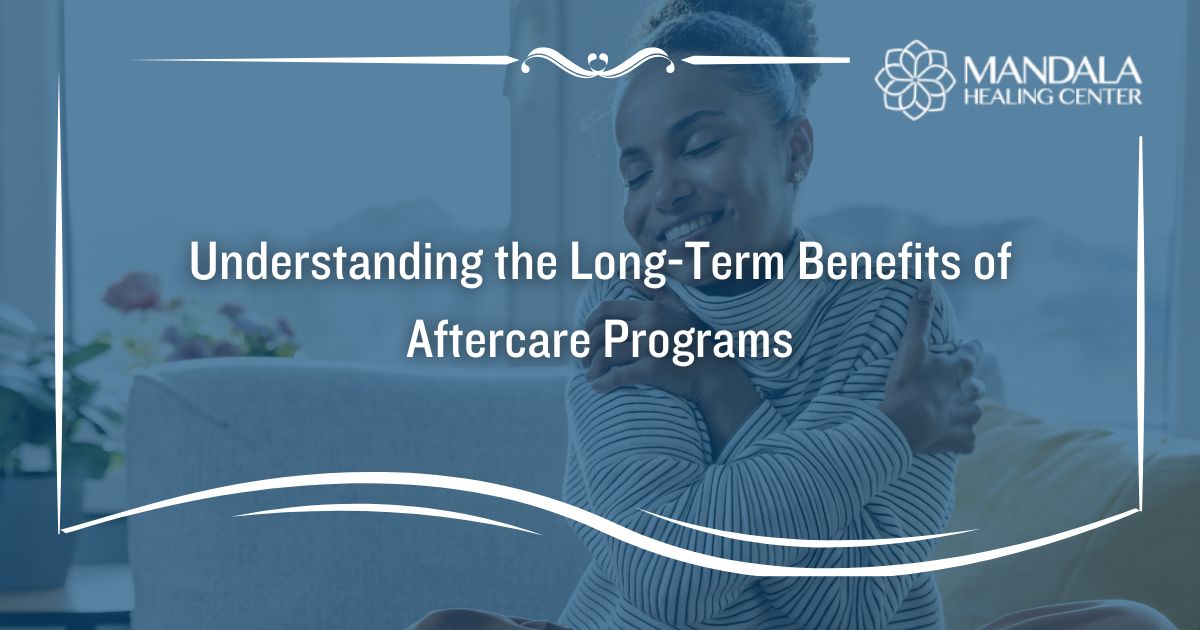Addiction is a chronic and progressive disease that affects millions of Americans each year. According to the Substance Abuse and Mental Health Services Administration (SAMHSA), 48.5 million people struggled with a substance use disorder in 2023.[1]
Because addiction is chronic, steps need to be taken to prevent relapse. While completing a treatment program is a huge accomplishment, you must take advantage of your facility’s aftercare services. To explain, aftercare programs are a service that keeps you connected with a support network, gives you access to recovery services, and helps you maintain long-term recovery.
If you have been offered access to an aftercare program, you might wonder about the benefits. Aftercare can give you access to continuous care services like therapy and medication management. These programs also offer benefits like learning coping skills to avoid relapse, building a strong support network, developing life skills, and accessing resources or referrals.
In this article, you will learn:
- What is an addiction treatment aftercare program?
- What services do aftercare programs offer?
- What are the benefits of participating in an aftercare program?
What is Aftercare in Addiction Treatment?
Aftercare plans offer ongoing support to help you maintain sobriety during early recovery. They begin immediately after you complete your addiction treatment program. A huge part of aftercare programs is helping you identify triggers for relapse and learning how to implement healthy coping mechanisms to ensure you stay sober.
Some of the services offered during aftercare programs include:
- Continued therapy sessions
- Medication management for MAT clients
- Access to an alumni program
- Referrals to outpatient programs or sober living facilities
- Recommendations on local support groups like 12-step meetings
- Case management services like vocational assistance and building life skills
One of the most beneficial aspects of aftercare programs is access to an alumni support group. To explain, your addiction treatment center has an alumni program that includes weekly or monthly meetings with other alumni who have completed treatment. You will discuss topics about sobriety, share healthy coping skills, and build a community based on support.
What are the Benefits of Aftercare in Recovery?
Aftercare programs help individuals in recovery maintain their sobriety after they’ve completed an addiction treatment program. It keeps you connected to a recovery community, provides you with services, and helps you develop the life skills necessary for success.
The main benefits of participating in an aftercare program include:
Continued Services
Many aftercare programs offer continued services that keep you focused on improving your recovery. For example, you might be offered access to regular therapy sessions with the therapist you met with during your treatment program. This allows you to continue working on changing negative behavioral patterns, addressing past trauma, and learning new coping skills.
Another example of a service offered during aftercare programs is medication management. If you were participating in medication-assisted treatment for opioid or alcohol addiction, this means you will still have access to the medications that lower your chance of relapsing. You might also receive continued medication management if you have a co-occurring mental health disorder that requires medication.
Learning Relapse Prevention Techniques
Aftercare programs help you develop a plan that allows you to avoid relapse and maintain long-term sobriety. You will identify possible triggers for relapse and learn what coping mechanisms work for you. It is also common to create a plan of action in case you relapse, which will include instructions on whether you need to re-enter an addiction treatment program.
Relapse prevention planning during aftercare programs makes it easier to stay sober long-term. Because the addiction relapse rate is between 40 to 60%, this part of aftercare is incredibly important.[2]
Building a Strong Support Network
People with addiction often feel isolated from others, as dealing with this disease can make you feel like no one else understands what you’re going through. This type of isolation can make you more likely to relapse. Thankfully, aftercare programs help you develop a strong support network, allowing you to see that you are not alone.
For example, aftercare programs often refer you to local support groups like 12-step programs or SMART Recovery. You will also have access to an alumni support group through your treatment center. During either type of support group, you can create lasting connections with others who understand what it’s like to recover from addiction.
Life Skills Development
Because it is common for addiction to take control over your life, you might have never developed the life skills you need to obtain services for yourself. Aftercare programs offer support from a case manager who can help you with life skills like vocational training, mock interviews, access to government assistance for housing or medical care, and more.
Access to Resources and Referrals
Another benefit of aftercare programs is the access they offer to resources and referrals. If you do not have a supportive environment to live in after treatment, your aftercare program can refer you to a sober living program. Additionally, you might be referred to an outpatient addiction treatment center if your aftercare team believes you need a little extra support.
Get Connected to a Reputable Drug and Alcohol Rehab Center
If you or a loved one suffers from addiction, it’s time to seek professional help. At the Mandala Healing Center, we offer an individualized addiction treatment program that includes long-term aftercare.
Contact us today for more information on our highly-rated drug and alcohol rehab program.
References:
- The Substance Abuse and Mental Health Services Administration (SAMHSA): Highlights for the 2023 National Survey on Drug Use and Health
- The National Institute of Drug Abuse (NIDA): The Science of Addiction Treatment and Recovery
















